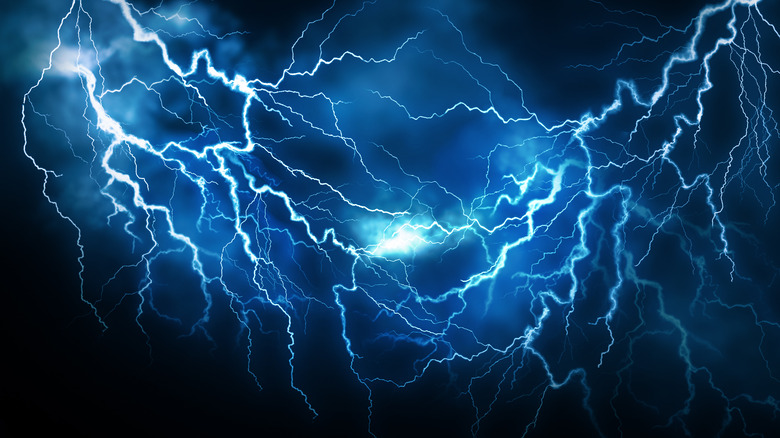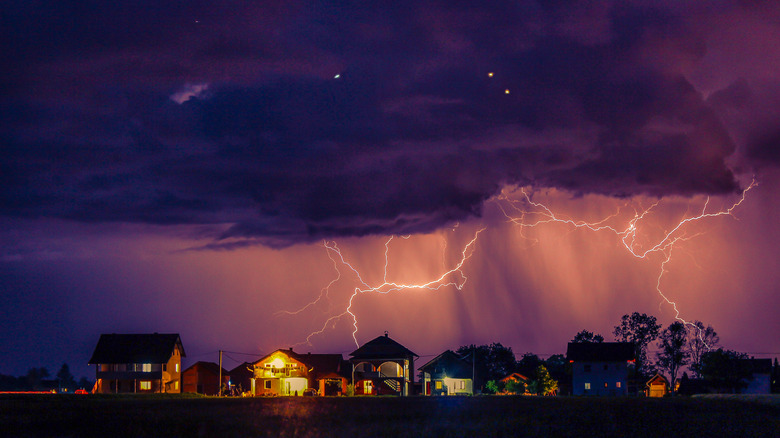How To Survive A Lightning Strike
You probably remember those days as a kid when the town pool was shut down at the first sound of thunder. You also probably remember your parents telling you to stay away from windows, and not hold metal objects during storms. It turns out all of this is sound advice, but there are also several other steps you can take to avoid falling victim to lightning.
You can also take comfort in the fact that your odds of being struck by lightning are pretty low already, per CNN (via KKTV). It's pretty much a one in a million chance that you will get struck by lightning during a storm, but it is still possible. According to the National Weather Service, as of September 26, 19 people had died from being struck by lightning in 2022 (via National Weather Service). Many of them were doing common, everyday activities, like walking their dogs, picking their kids up from school, jet skiing and rowing, or simply loading their car.
Steps to avoid being struck
The best survival tip to prevent a lightning strike is to avoid it (via KKTV). That might seem painfully obvious, but it's true. If you hear thunder, go inside if you can. And by inside, we mean a lightning-safe structure with grounded wiring and plumbing — not a tent, picnic area, or shed. Grounded wiring and plumbing help redirect electrical currents from lightning directly into the Earth, while temporary or less-solid shelters cannot provide the same protection (via CNN).
While inside, you should also stay away from running water — which could be a conductor of electricity — as well as avoid porches, balconies, and things that might conduct electricity, like metal or plugged-in, corded devices. If you can't get inside, but you have your car, you should wait it out in the vehicle until it's been at least a half-hour since you last heard thunder. And if that also isn't an option, avoid open fields, high-up places, and tall objects like trees, which can fall, drop branches, conduct electricity themselves, or ricochet lightning strikes onto surrounding bystanders. Low areas are your safest best. Avoid bodies of water; many lightning-related accidents happen on uncovered boats.
In case of disaster
It's not very common to be struck by lightning (via KKTV). Providing a little more comfort, about 90% of lightning strike victims survive (via CNN). But those who are affected can face pretty serious damage, injury, and even chronic disability. Some lasting effects documented have been seizures, memory loss, chronic neurological and muscle damage, and trauma (via Atrium Health). Rhabdomyolysis is also a potential fear for lightning strike victims. The condition causes damage to the kidneys through breakdown of muscle tissue, which floods the bloodstream with a toxic protein.
Immediate concerns posed by a lightning strike are burns, heart attack, brain hemorrhage or stroke, shock, blunt trauma (via Centers for Disease Control and Prevention), and fern-like deformations across the skin, called Lichtenberg figures, which are indicative of inflammation-damaged capillaries (via National Library of Medicine). If someone is struck by lightning, 911 should be called immediately, and those who are certified in CPR can conduct it if needed. Due to the potential chance of heart attack, the victim's pulse should be checked. It's also notable that someone struck by lightning does not continue to carry any electrical charge, so it's okay to move them somewhere safe. Even being near a lightning strike can cause minor burns or damage to ear drums, so long story short — stay inside.


